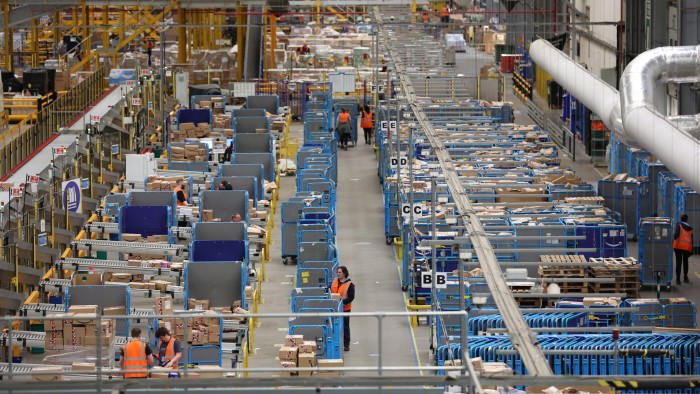Unlock the Editor’s Digest for free
Roula Khalaf, Editor of the FT, selects her favourite stories in this weekly newsletter.
Dozens of Amazon workers in the UK have suffered serious injuries over recent years, including being blinded or requiring amputations, according to new data that is leading to renewed calls on the ecommerce giant to improve the treatment of vulnerable staff.
The $2.4tn Big Tech group and related entities reported 119 serious injuries because of work-related accidents to the country’s workplace health and safety regulator between 2019 and 2024, according to a response to a UK Freedom of Information request submitted by the Financial Times.
The figures reveal that Amazon workers have suffered 106 bone fractures, lost consciousness on eight occasions, there were at least three finger amputations and two eyes were blinded.
The roles of those injured included warehouse and sorting associates, delivery drivers, engineering apprentices and a safety co-ordinator.
The estimated average rate of non-fatal injuries in the workplace is 1,890 per 100,000 workers in 2023/24, according to the UK’s Health and Safety Executive.
However, the figures obtained through the freedom of information request on Amazon only cover so-called “specified injuries,” which is limited to certain serious cases rather than all non-fatal injuries.
Amazon said using the figures provided by HSE “to suggest our workplace is dangerous is completely inaccurate — the truth is the opposite”. It added that the company in 2022 had “50 per cent fewer injuries than the rest of the transport and warehousing sector” when its injury rates were benchmarked against national data.
Founder Jeff Bezos pledged in 2021 that the company was “going to be earth’s best employer and earth’s safest place to work”.
However, union leaders have repeatedly raised concerns about Amazon’s safety record. Stuart Richards, a senior organiser at the GMB, which earlier this year attempted to force the group to recognise a union in the UK for the first time, said the new injury data “unveiled a serious catalogue of issues”.
Richards added it was “time for Amazon bosses to take the health and safety of its workforce seriously”.
The injury data released in the FT’s freedom of information request shows the rate of serious injuries across its network was at its lowest in six years while the number of its employees had more than doubled over the same period, Amazon said.
However, the figures for 2024 do not cover the full year, such as the Christmas holiday period, which is among the busiest trading periods.
“We’re proud of our working environment, and we encourage everyone to take a tour of one of our sites and see first-hand the safe, modern workplace we provide,” Amazon added.
Employers, and other people in charge of work premises, are required to report so-called specified injuries due to work-related accidents to the HSE. The work statuses of those with reported injuries included employees, the self-employed and those employed by others.
Amazon also reported five diagnoses of occupational diseases over the same period, including tendonitis, dermatitis and a disease caused by occupational exposure to biological agents. But the Seattle-headquartered company did not report any deaths due to a work-related accident over the past six years in the UK, the HSE response said.
Martha Dark, co-executive director at Foxglove, a tech campaign group, said some workers across Amazon’s UK business were “getting seriously hurt”.
She added “evidence from the US has shown the pace of work Amazon demands from its workers — especially in robotic warehouses — is a major driver of injury in the workplace and forces workers to work faster than is safe”.
Amazon said that “robotics help reduce injuries,” as they reduce the need for employees to perform repetitive or strenuous tasks, with the company having allocated $750mn for improving workplace safety this year. “Safety is a critical area where robotics is making a significant difference,” it added.
Richards from the GMB said he was also “concerned that the official statistics are only telling part of the story”, as the union had heard of instances where accidents and injuries were “not treated appropriately” and workers were “sent home in taxis rather than being sent to the hospital in an ambulance”.
Amazon said in response: “Be under no illusion, we will always call an ambulance when colleagues need one in an emergency, whether it’s a work or non-work related incident. Yes, taxis have been used to take staff home or to the hospital, but that’s the right thing to do surely?”
The HSE in a statement said the “majority of work-related incidents at Amazon warehouses occur at fulfilment centres, which are regulated by local authorities” and that the regulator “will take action” where it finds breaches of health and safety law in workplaces that fall under its enforcement.
Data visualisation by Jana Tauschinski


